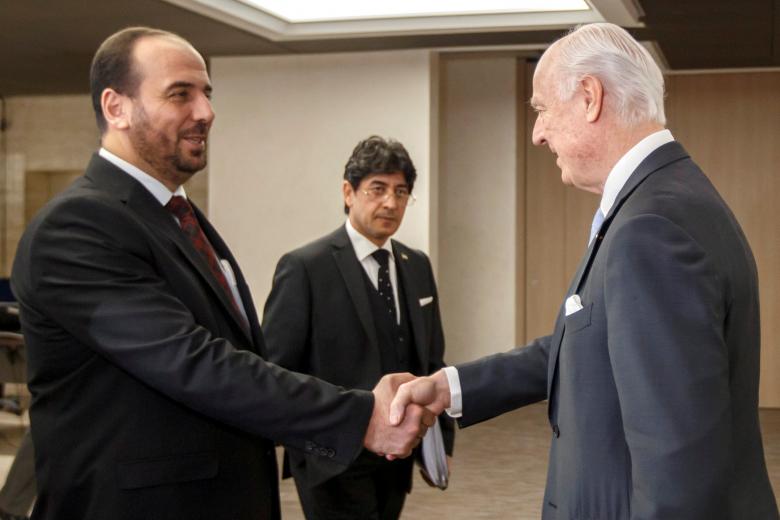London- Syria’s main opposition High Negotiations Committee (HNC) leader Nasr al-Hariri said that his side doesn’t bet on the Syrian regime accepting political transition, saying that to do so is delusional.
He explained that the Syrian opposition is merely testing Russia’s true intentions and conviction towards a political settlement being the only way to end the six-year crisis ravaging Syria.
Such a political solution would be based on the premises outlined by the Geneva statement and the United Nations Security Council resolutions 2218 and 2254.
Hariri added that it is not possible to accept Iran as a guarantor state for the recently signed de-escalation zones agreement in Kazakhstan’s capital, Astana.
“One of the major reservations is that Iran cannot be considered a guarantor state, given it has long shared the regime in its destruction, displacement, unwarranted demographic sieving, and besiegement against Syrians,” said Hariri.
During the fourth round of the Astana talks on May 3-4, a document envisaging the creation of four “de-escalation zones” on the ground where no military activity would be allowed, was signed.
“There is a proposed roadmap—however, the opposition remains reserved and hopes to ask for further explanations.”
It works on introducing no-fly areas and adequate conditions for humanitarian aid access.
The memorandum was signed by Russia, Turkey, and Iran. The parties also agreed to convene another meeting in Astana in mid-July, which will be preceded by a technical meeting of military experts two weeks prior in Ankara.
Relying on former acts of aggression staged by the regime of Bashar Al-Assad and Iran, Hariri said that Iran stepping down from its role as a guarantor state is central to end the escalation of the war.
As for terror militias which infected mass Syrian terrain, Hariri explained that “defeating the terror group ISIS is against the interests of the regime.”
The top Syrian opposition figure harshly criticized Kurdish-Arab “Syrian Democratic Forces” (SDF), supported by the US-led coalition.
“SDF units are terrorist forces— in the opinion of the Syrian opposition they are no different from ISIS,” Hariri said.
He also called for supporting the rebel-composed Free Syrian Army (FSA), considering it the sole true anti-ISIS Syrian force.
In a phone call interview with Asharq Al-Awsat newspaper, Hariri said that his delegation was informed by the UN special envoy to Syria Sataffan De Mistura on a meeting with the Astana committee scheduled for later around 12-15 June, 2017.
In preparation for a sooner meeting on June 5- bringing together the HNC and the Astana committee – Hariri said that previous stages of Geneva negotiations and Astana talks must be run through a detailed evaluation.
More so, a critical assessment must cover recent political and field developments in Syria.
“Since the last meeting, there have been major developments on the ground in terms of continuing demographic change and ceasefire breaches to the agreement,” said Hariri.
“Even the ‘de-escalation’ zones were targeted by either the regime forces, Iran or Russia. Also, there are developments related to the Battle of Raqqa, in addition to the historic visit of US President Donald Trump to Riyadh, the important summits that took place there, and other developments,” he added.
“What we want is a comprehensive implementation and commitment to a nation-wide ceasefire so that rebel-controlled areas —which include unarmed civilians, infrastructure, public service and medical centers, and which have been incessantly targeted by the regime, Iran, and Russia— are no longer attacked.”
Commenting on a rumored dispute existing among rebels’ political representation and military wing, Hariri said that the quarrel has nothing to do with the political stance itself, but revolves mostly around disagreements on approaches and strategies.
Disagreement was first noticed when rebel delegates withdrew on multiple occasions from Geneva talks. However, Hariri reassured that it is in the process of being resolved amidst a positive atmosphere upheld by the opposition.
“Internal negotiations will be held in order to draft the most suitable framework for partaking negotiations while remaining faithful to core values of the revolution,” Hariri added.
